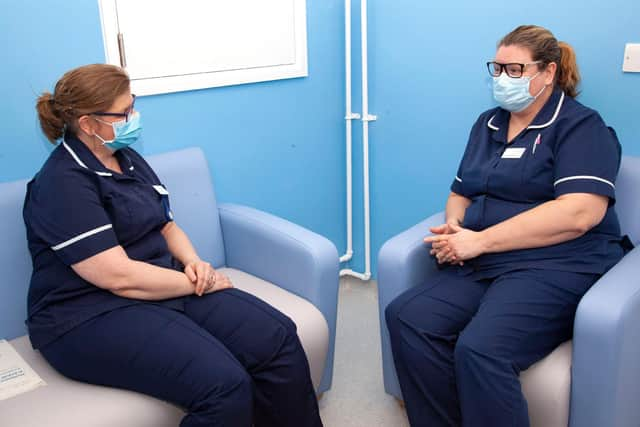Doncaster hospitals appoint workers to help mental health of NHS staff after Covid
and live on Freeview channel 276
The Trust has appointed its very first Professional Nurse Advocate Lead Nurses as part of a clinical development scheme for registered nurses and was introduced in response and recognition of the effects that the pandemic has had on NHS staff.
PNAs offer something known as ‘restorative clinical supervisions’ – the means placing an emphasis on strengthening an individual’s ability to cope by providing a safe psychological space for them to discuss how they are feeling, how their profession impacts on this and how it can affect their professionalism.
Advertisement
Hide AdAdvertisement
Hide AdIt was created to address challenges within critical care, such as supporting nurses who may be at risk of burning out and in turn could have a negative effect on patient safety, quality of care, staff wellbeing, and absence rates.


Jenny Hunt was one of the first 400 individuals in the country to receive training and has subsequently been successfully appointed into a Lead Professional Nurse Advocate at the Trust through a joint appointment with the University of Sheffield.
Jenny has been seconded into the role and will work to develop a network of trained PNA’s at DBTH, in conjunction with the University of Sheffield who deliver the PNA academic programme locally. The PNA role provides a model of supervision which supports a continuous improvement process that builds personal and professional resilience, enhances quality of care, and supports preparedness for appraisal and revalidation.
Currently there are three qualified PNAs, including Jenny, across the Trust and a further 21 who are either in training, or shall be going into training shortly.
Advertisement
Hide AdAdvertisement
Hide AdThe vision, in line with the national strategy, is for the Trust to have one PNA to every 60 nurses by the end of this year.
By the following year this will hopefully increase to one PNA to every 40 nurses, and by 2025 they hope to have one PNA to every 20 nurses. The programme is driven by Ruth May, the Chief Nurse at NHS England, and is currently only open to Registered Nurses, but will hopefully be extended to other Allied Healthcare Professionals and other NMC registrants in the future.
Jenny commented on why she wanted to take up this new role.
She said: “Having been a nurse for 25 years, I can see that having access to a PNA would have been of great benefit as it would have prevented me from feeling burnt out at times. It would have given me the psychological support that has not particularly been there and that safe space to discuss how I was feeling, what I wanted to do, where I wanted to go, and how I was going to progress.
“It has really given me the confidence to support staff and see what a difference looking after staff wellbeing will have on patient care. This is our aim, to make sure we have safe, effective practitioners, who enjoy their job and working for the Trust.”
Advertisement
Hide AdAdvertisement
Hide AdDavid Purdue, Deputy Chief Executive and Director of Nursing, Midwifery and Allied Health Professionals, said: “Ensuring we support colleagues is incredibly important to us at Doncaster and Bassetlaw Teaching Hospitals particularly given the challenges of the past two years. With our participation in the Professional Nurse Advocate Training Programme, we hope to provide colleagues with the skills to facilitate restorative supervision, and all of the benefits this way of working will undoubtedly bring.
“I am confident that Jenny will do a fantastic job in her new role, and we hope that many others will follow in her footsteps, helping to further improve our Trust as a place to work, as well as receive care.”